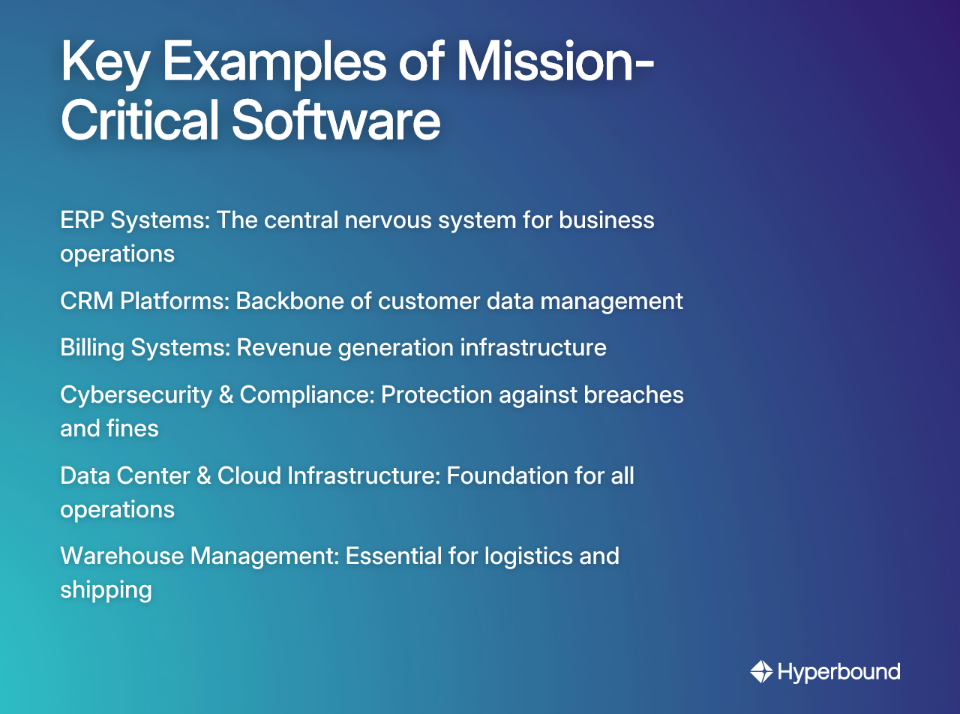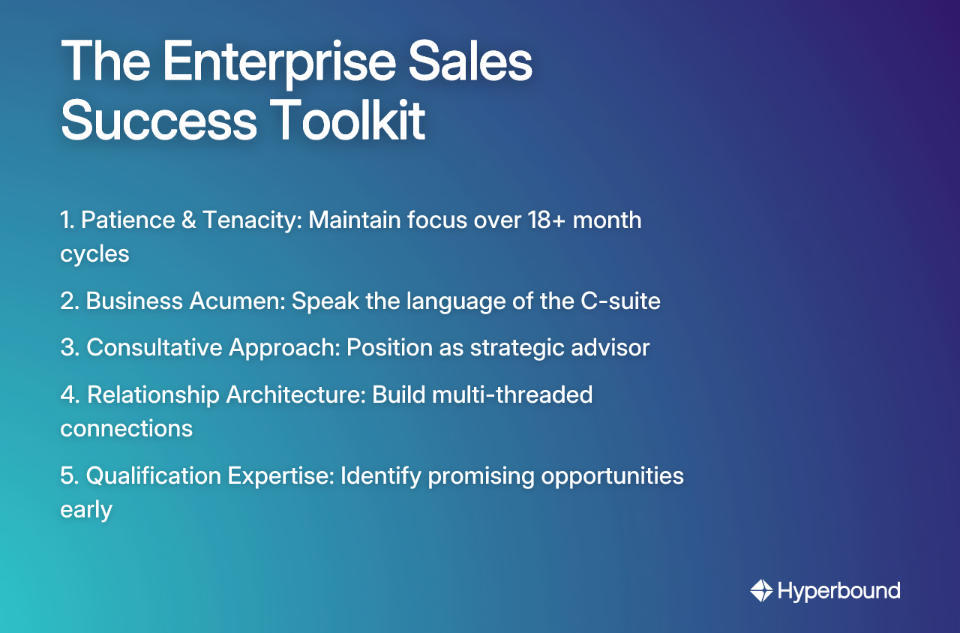.png)
You've been working on this enterprise deal for 14 months. Multiple stakeholders, countless meetings, and a proposal that's been revised seven times. Your pipeline report shows it at 70%, but closing seems just out of reach. Meanwhile, your colleagues in SMB sales have closed dozens of deals in the same timeframe. You're starting to wonder: is the marathon of enterprise software sales really worth it?
The answer is an emphatic yes—if you know how to run it.
In the high-stakes world of mission-critical enterprise software, sales cycles stretching 18-24 months are not unexpected—they're the norm. But as one veteran in the space puts it: "The sales cycle takes two years, but if you land one you can sincerely be in a position to make a million dollars." This isn't hyperbole; it's the reality of selling solutions that form the backbone of modern business operations.
What Makes Software "Mission-Critical"?
Mission-critical software isn't just important—it's essential for an organization's survival. Its failure leads to severe operational disruption and potentially catastrophic financial consequences.
The litmus test is simple: What happens when the system goes down? As one industry expert vividly describes, "Imagine what would happen in an Amazon warehouse if all of the printers, scanners and mobile computers stopped working." The entire operation grinds to a halt. Revenue stops. Customers become furious. That's mission-critical.
Key examples include:
- ERP (Enterprise Resource Planning): The central nervous system integrating finance, HR, manufacturing, and supply chain into a "single source of truth." Companies like SAP and Oracle dominate this space.
- CRM (Customer Relationship Management): The backbone of customer data management and sales operations.
- Billing Systems: How a company gets paid—one salesperson reported making $500,000 annually selling this solution.
- Cybersecurity & Compliance Software: Often viewed as a "nice to have" until an audit looms or a breach occurs, resulting in "crazy expensive" fines.
- Data Center Infrastructure: The foundation everything else is built upon. "Customers pay a lot of money to avoid outages," notes one seller in this space.
- Cloud Infrastructure: The modern delivery mechanism for mission-critical applications.
- Warehouse Management Software (WMS): Essential for logistics operations where downtime means shipping stops.

The definition of "mission-critical" varies by industry. Manufacturers rely heavily on ERP for asset management and inventory control. Retailers focus on data integration for e-commerce and brick-and-mortar operations. Financial institutions depend on identity protection software and AI-powered analytics for fraud detection.
Why Does It Take So Long? Deconstructing the Marathon
Enterprise software sales cycles ranging from 6 to 24 months aren't a bug—they're a feature of the space. Several factors contribute to this extended timeline:
High Stakes & Risk Aversion
Implementing new ERP or financial software is like performing open-heart surgery on a business. The risk of failure is enormous. A failed implementation can cost millions, derail careers, and in extreme cases, threaten the organization's existence. This creates natural caution and extended due diligence.
Organizational Complexity
Enterprise deals involve multiple decision-makers across different departments, each with their own priorities and concerns. The IT team worries about integration and security. Finance focuses on ROI and TCO. Operations cares about implementation timelines and disruption. Legal scrutinizes contracts and compliance. Getting alignment across all these stakeholders takes time.
Displacing the Incumbent
Your biggest competitor isn't usually another vendor—it's the existing system and the inertia it represents. As one enterprise AE notes: "I'm selling to hugely conservative organizations that you can only 'sell' so much before they close the door on you." Overcoming status quo bias requires patience and strategic persistence.
Financial Scrutiny
These are multi-million dollar investments requiring extensive budgeting, justification, and sign-off from the highest levels of leadership. Many organizations have annual budget cycles, meaning if you miss one window, you might wait months for the next opportunity.
The Complex Sales Process
A typical enterprise software sales cycle includes multiple distinct phases:
- Discovery and Analysis: Understanding the organization's structure, key players, challenges, and decision-making processes.
- Definition and Qualification: Filtering prospects with genuine needs and financial capacity through lengthy conversations to align on requirements.
- Proposal Development: Creating tailored strategies demonstrating how your solution meets requirements for both technical and non-technical stakeholders.
- Negotiation and Closing: Navigating procurement, legal reviews, and contract negotiations.
- Implementation Planning: Laying groundwork for successful deployment and identifying expansion opportunities.
Each phase can take months, and setbacks at any point can extend the timeline further.

The Million-Dollar Skillset: Thriving in the Long Game
Success in selling mission-critical software requires a specialized skillset that goes far beyond traditional sales techniques:

Patience & Tenacity
The ability to maintain energy and focus over 18+ months without getting discouraged is paramount. Rushing can kill a deal. You must be comfortable playing the long game, celebrating small victories along the way.
Deep Business Acumen
You're not selling software; you're selling business transformation. This requires understanding industry dynamics, organizational structures, financial models, and regulatory requirements. You must speak the language of the C-suite, connecting your solution to strategic objectives.
Consultative Selling
The most successful enterprise sellers position themselves as strategic advisors, not vendors. This involves truly understanding the client's business, helping them identify problems they didn't even know they had, and building a vision for transformation that executives can rally behind.
Relationship Architecture
Building strong, multi-threaded relationships with all stakeholders ensures the deal survives organizational changes. If your primary champion leaves the company (which happens frequently during long sales cycles), having multiple advocates becomes crucial.
Flawless Qualification
Perhaps the most important skill is knowing which opportunities to pursue. You must have a rigorous qualification strategy to identify key decision-makers early and assess the true potential of a deal to avoid wasting years on dead ends.
Maintaining Momentum: Strategies for Success
Keeping a deal moving forward over 18+ months requires deliberate strategy:
Provide Continuous Value
Don't just "check in." Maintain momentum with regular, valuable touchpoints. Share relevant industry insights, case studies, and resources that help the client with their evaluation process.
Leverage Modern Sales Tools
Successful enterprise sellers utilize a suite of tools to stay organized and effective:
- AI Sales Coaching Platforms: Tools like Hyperbound let reps practice complex enterprise conversations in realistic AI roleplays, ensuring they are prepared for high-stakes meetings.
- CRM Software: Essential for managing contacts, deal stages, and tracking progress over long cycles.
- Content Enablement Platforms: To organize and surface relevant case studies, white papers, and proposals at the right time.
- Conversation Intelligence Tools: For analyzing call recordings to identify coaching opportunities and potential roadblocks.
Master the Follow-Up
Consistent, value-added communication builds trust over time. Document all interactions meticulously and maintain a rigorous follow-up cadence without overwhelming the client.
The Payoff: Why the Grind is Worth It
The financial rewards for mastering enterprise software sales are substantial:
Commission Structures & Real Numbers
Enterprise software sales professionals typically earn base salaries of $120,000-$200,000 with commission targets equal to or exceeding their base. Commission rates generally range from 5% to 20% of deal value.
For mission-critical software like ERP, telephony and communication software, or point of sale (POS) systems, a single deal can generate commissions in the hundreds of thousands. One salesperson reported earning $500,000 annually from selling billing software, while others in the automation tools space routinely break seven figures.
Why Many Sellers Avoid This Space
Despite the lucrative potential, many sellers avoid enterprise software sales due to:
- The inherent unpredictability of long sales cycles
- The high level of commitment required
- The delayed gratification factor
This self-selection creates an advantage: less competition at the top for those with the right skills and mindset.
The Final Word: Winning the Marathon
Selling mission-critical software like ERP, compliance software, or data center infrastructure is undoubtedly challenging. It requires patience, deep business acumen, and strategic relationship-building that many sales professionals lack or aren't willing to develop.
But for those who master these skills, the rewards—both financial and professional—are unparalleled. While your colleagues chase dozens of smaller deals, you can focus on a handful of enterprise opportunities that transform both client organizations and your own career.
In enterprise software sales, patience isn't just a virtue—it's the path to prosperity.
Frequently Asked Questions
What qualifies as mission-critical software?
Mission-critical software is any application that is absolutely essential for an organization's survival and core operations. Its failure would lead to immediate and severe disruption, significant financial loss, and potential reputational damage. Examples include ERP systems that manage a company's entire operation, billing systems that process revenue, and cybersecurity software that protects against catastrophic data breaches.
Why do enterprise software sales cycles take so long?
Enterprise software sales cycles are long, often 18-24 months, due to the high stakes and significant investment involved. The process includes extensive due diligence from multiple departments (IT, finance, legal), the complexity of aligning numerous stakeholders, the challenge of displacing existing incumbent systems, and rigorous financial scrutiny that must often align with annual budget cycles.
How much can a salesperson make selling enterprise software?
Top-performing enterprise software salespeople can earn well into six or even seven figures annually. While base salaries typically range from $120,000 to $200,000, commission on multi-million dollar deals can be substantial, often ranging from 5% to 20% of the deal value. A single large deal can result in a commission of hundreds of thousands of dollars.
What are the most important skills for an enterprise software salesperson?
The most crucial skills for success in enterprise sales are patience, deep business acumen, and a consultative selling approach. Successful reps act as strategic advisors rather than vendors, build multi-threaded relationships across the client's organization, and are experts at qualifying opportunities to avoid wasting time on deals that won't close.
How can I maintain momentum during a long sales cycle?
To maintain momentum, you must consistently provide value beyond simply "checking in." This involves sharing relevant industry insights, tailored case studies, and helpful resources that assist the client in their evaluation. Leveraging modern tools like a CRM to track interactions and a rigorous, value-added follow-up cadence are also essential for keeping the deal moving forward over many months.
What's the biggest challenge when selling mission-critical software?
The biggest challenge is often overcoming the organization's inertia and risk aversion associated with replacing an existing system. Your primary competitor is not another vendor but the status quo. It requires immense patience and strategic persistence to build a compelling business case for change that outweighs the perceived risk of a complex implementation.

Book a demo with Hyperbound
.png)













